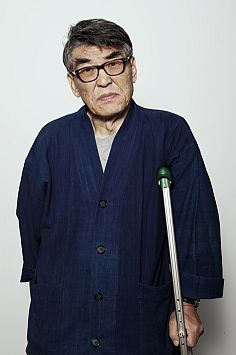
Kim Chi-ha
- South Korean
- Zu Gast beim ilb: 2011
Kim Chi-ha (actually Kim Yong-il) was born in Mokpo in South Korea in 1941. He began to study aesthetics at the Seoul National University in 1959, and published his first poems in »Shi-in« (tr.: The Poet), a literary journal in Korea, in 1969. »The Five Bandits« (tr.) appeared in 1970.
This social satire emulates the rhythm of the traditional Korean Pansori, the author, however, merges the popular epic style with the poetry of resistance, and expands its scope by including themes and motifs that reflect the everyday life of farmers, fishers, and workers. His anthology »The Yellow Earth« (tr.) is published in the same year. The poet converted to Catholicism in 1971, and the authorities prohibited the performance of his plays »The Copper Yi Sun-sin« (tr.) and »Napoleon Cognac« (tr.). A strong opponent of the dictatorial regime of Park Chung-hee, Kim Chi-ha, whose nom de plume means »underground«, was arrested several times and finally sentenced to death in 1974. The verdict was changed to a life sentence shortly after. Thanks to the sharp protest of an international committee, involving Jean-Paul Sartre, Heinrich Böll, Noam Chomsky and others, Kim Chi-ha was set free in 1975, but soon imprisoned again, and released only in 1980 for humanitarian reasons. While, in the years of the dictatorship, the poet saw the poem as a »weapon of the word«, he gave up his role as the mouthpiece of the democracy movement after the ban on his poems was lifted in 1984. He turned towards a »philosophy of life« that has its roots in traditional Asian thinking, which is reflected in his poems in the early 1980s. His lyrical oeuvre is henceforth dedicated to the contemplation of nature, the recognition of universal contexts, and the themes of love, death, grief and loneliness. »Truly / lonely. / I / have nothing left. Therefore / I embrace / the sun and the moon, / and the consumed earth, too, and through and through / the corrupt life, / and the soft moaning of the / worms in the wood. / The rare / laughter of my family / is nothing but a free gift. / That is all of which consists today / my life.« From the 1990s on, Kim Chi-ha considered it a »heavenly mission« to use the language sparingly, so that life can resonate in the interstices. In these years he published his collection of poems »Suffering in the Centre« (tr.) (1994). The new tendency in Kim’s lyrical work also found its expression in the anthology published in Korea in 2002: For »The Bursting of the Bud« (tr.) he received the renowned Korean Manhae and Daesan literary rewards.
Kim Chi-ha was elected »Poet of the Year« in the Netherlands in 1980. The Austrian Bruno Kreisky Award was bestowed upon him in 1981.
© internationales literaturfestival berlin
Die gelbe Erde und andere Gedichte
Suhrkamp
Frankfurt am Main, 1983
[Ü: Doohwan Choi u. Siegfried Schaarschmidt]
Blütenneid
Wallstein
Göttingen, 2005
[Ü: Yang Han-ju u. Matthias Göritz]
Aufgehen der Knospe
Abera
Hamburg, 2006
[Ü: Kang Seung-Hee mit Torsten Zaiak]
